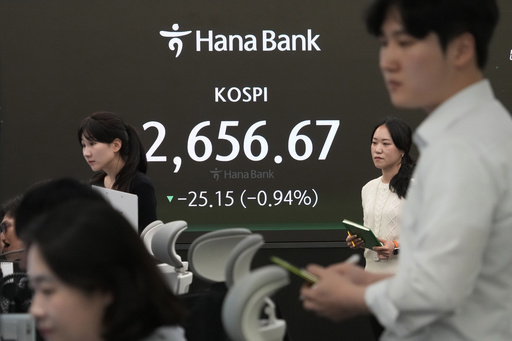HONG KONG (AP) — Asian stocks pulled back while European markets opened higher on Monday as worries about potentially escalating tensions in the Middle East rattled financial markets, pushing investors to look for safer places for their money.
The future for the S&P 500 gained 0.5%, and that for the Dow Jones Industrial Average was 0.4% higher.
Oil prices fell despite tensions roiling the Middle East, where an attack late Saturday marked the first time Iran had ever launched a military assault on Israel, despite decades of enmity dating back to the country’s 1979 Islamic Revolution.
A barrel of benchmark U.S. oil declined 97 cents to $84.69 a barrel. Brent crude, the international standard, lost $1.22 to $89.23. Slower demand from China, combined with forecasts that growth in supply is outpacing demand, has kept prices in check.
“While the drone attack has grabbed headlines, its immediate impact on global markets, particularly oil prices and inflation concerns, may be subdued,” Stephen Innes, managing partner at SPI Asset Management, said in a commentary. “The precision and limited lethal impact of Iran’s response suggest a strategic approach aimed at minimizing damage rather than escalating tensions.”
European markets were mostly higher in early trading, with Germany’s DAX up 0.8% to 18,075.85. The CAC 40 in Paris rose 0.6% to 8,060.14. In London, the FTSE 100 slipped 0.5% to 7,959.92.
In Asian trading, Japan’s benchmark Nikkei 225 slipped 0.7% to 39,232.80.
In currency trading, the U.S. dollar rose to 153.87 Japanese yen from 153.07 yen, hitting another 34-year high as investors shifted toward the traditional haven in times of uncertainty. The euro cost $1.0659, up from $1.0635.
Australia’s S&P/ASX 200 dipped 0.4% to 7,754.50, while South Korea’s Kospi shed 0.4% to 2,670.43.
Hong Kong’s Hang Seng dropped 0.6% to 16,619.33. The Shanghai Composite gained 1.3% to 3,057.38 after the market regulators announced further measures to support the financial sector.
Elsewhere in Asia, Taiwan’s Taiex was 1.4% lower and the Sensex in India fell 0.8% as the country geared up for a lengthy national election process.
On Friday, shares fell on Wall Street following a mixed start to the earnings reporting season.
The S&P 500 sank 1.5%, closing out its worst week since October. The Dow Jones Industrial Average dropped 1.2% and the Nasdaq composite fell 1.6% from its record set the day before.
A stream of reports this year has shown both inflation and the overall economy remain hotter than expected. That’s forced traders to scale back forecasts for how many times the Federal Reserve may cut its main interest rate this year. Traders are largely betting on just two cuts, according to data from CME Group, down from forecasts for at least six at the start of the year.
U.S. stock indexes had already run to records in part on expectations for such cuts. Without easier interest rates, companies will need to produce bigger profits to justify their stock prices, which critics say look too expensive by various measures.
Source: post





